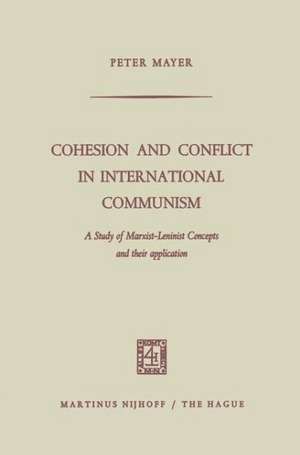Cohesion and Conflict in International Communism: A Study of Marxist-Leninist Concepts and Their Application
Autor Peter Mayeren Limba Engleză Paperback – 1968
Preț: 639.41 lei
Preț vechi: 752.24 lei
-15% Nou
Puncte Express: 959
Preț estimativ în valută:
122.37€ • 126.67$ • 103.43£
122.37€ • 126.67$ • 103.43£
Carte tipărită la comandă
Livrare economică 05-19 martie
Preluare comenzi: 021 569.72.76
Specificații
ISBN-13: 9789401500302
ISBN-10: 9401500304
Pagini: 276
Ilustrații: 257 p.
Dimensiuni: 155 x 235 x 14 mm
Greutate: 0.39 kg
Ediția:1968
Editura: SPRINGER NETHERLANDS
Colecția Springer
Locul publicării:Dordrecht, Netherlands
ISBN-10: 9401500304
Pagini: 276
Ilustrații: 257 p.
Dimensiuni: 155 x 235 x 14 mm
Greutate: 0.39 kg
Ediția:1968
Editura: SPRINGER NETHERLANDS
Colecția Springer
Locul publicării:Dordrecht, Netherlands
Public țintă
ResearchCuprins
I. The Unity Theory VS. Socialism in One Country.- From “Proletarian internationalism” to “Socialism in One Country”.- II. The Soviet View of the Socialist World State: Development and Control Factor Aspects.- The Soviet Conception of the Communist Camp Future.- III. A Consideration of Chinese Contributions to “Marxism,” Including “Prolonged Struggle” and “revolutionary Fervor”.- The Chinese Communist View of Permissible and Impermissible “Paths to Socialism”.- IV. The Sino-Soviet Dispute, and Some Implications for the Future of the World Communist Movement.- The Dialectics of Dispute: Tactics and Strategy of Communist Concepts in the Thermonuclear Age.- Unity or Diversity.- Factors Tending Toward Unity in the Communist Camp.- The Breakdown in Communications.- The Changing Political Realities.- The Italian and German Party Congresses, 1962 and 1963.- Communist Dogma or “Creative Marxism”?.- V. The Soviet Union and East Europe: Conflict, Support and Opposition.- Institutionalized Divergence: The Case of Yugoslavia.- Albania: China’s Window to Europe.- Poland: Nationalism Contained by Territorial Claims.- Hungary: From Repression to Permissiveness?.- Rumania: Path to Economic Independence.- Bulgaria: Unconditional Support for the U.S.S.R..- Czechoslovakia: Politics take Precedence over Ideology.- East Germany: The Permanent Satellite.- Conclusion.- VI. The International Communist Movement: A Reappraisal of Some Theoretical Concepts.













